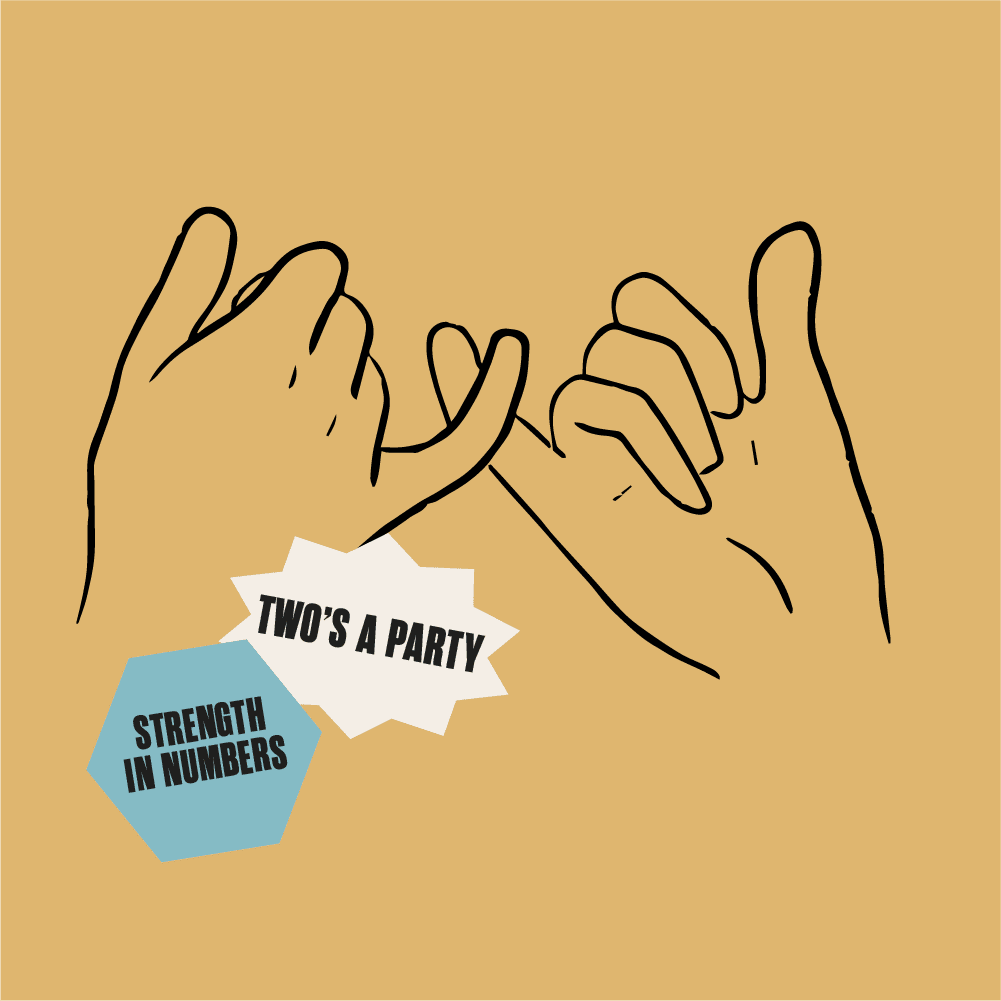A caregiver’s guide to
Supporting a Friend
Near, far, wherever you are – supporting someone you love while they go through cancer can be challenging. We’ve got your back, so you can have theirs.
Near, far, wherever you are – supporting someone you love while they go through cancer can be challenging. We’ve got your back, so you can have theirs.

When it comes to supporting your friend, you know them best. Every friendship is unique, so do what feels right for your relationship.

The little things are often the most meaningful. Just calling your friend or watching a movie with them can mean the world when they’re going through it.
Try to process your own feelings before talking to your friend. They’re going through enough already, they don’t need to take on the burden of processing your feelings too. Learn more here.
Your friend is still the same person they’ve always been. Don’t forget to talk to them about all the interests and passions you share, in addition to talking to them about cancer if they want to.
You don’t need to be an expert, but doing a little background research on their cancer allows you to spend your time talking about other things and not just having them regurgitate facts. But remember that every experience is unique.
While you should never assume you know what they’re going through, consider what your friend might be going through and things you can do to help. This will make you more empathetic when you talk to them.
Both people with cancer and their caregivers need a strong support system around them when dealing with cancer. Make sure their caregiver feels supported too, if appropriate.
Cancer doesn’t end when treatment is over. If your friend is open to it, continue to offer support as time goes on.

When a friend is diagnosed with cancer, it can feel scary and overwhelming. You might not know what to say or not to say. Just remember that your friend is still the same person they’ve always been. Talk to them like you normally would, be honest, and if you’re not sure, ask them. Sometimes saying you don’t know what to say is the best thing you can say. If you’re stuck, here are some ways to start:
“I’m sorry this is happening.”
“I love you and am here for you.”
“Whenever you want to talk, I’m here.”
“How can I help today? What about next week?”
“It’s good to see you.”
“Fuck Cancer!”
Knowing how to start the conversation can be the hardest part. Feel free to communicate in person, over the phone, via text, or video call. Check in with your friend to see what they prefer and if they’re up for a visit. It’s also nice to remind them that they don’t have to reply if they’re not feeling up to it.

Keep these tips in mind to help guide your friendship in this new stage.
Whether you have a standing date or just reach out whenever you’re thinking of them, check in on your friend consistently so they know they can rely on you.
Make plans that can easily be changed and try to remain understanding if your friend needs to adjust your plans. Living with cancer means dealing with unexpected health and emotional changes.
Let them know that it’s okay if they need to lay low or not reply sometimes. You’ll still be here when they’re ready.
Follow their lead about discussing certain topics or their energy for certain activities.
Your friend’s health is their own. Don’t try to pressure them into any decisions related to their cancer or treatment, and only give your opinion if asked.
Make sure it’s okay for you to see them in person, give advice, or ask questions about their cancer before doing so. They may not always be up for these things.
Don’t forget to laugh and have fun just like usual. When you’ve lost your sense of humor, you’ve lost it all.
It’s easy to want to avoid sadness or talking about heavy topics with your friend when they have cancer. But it’s important not to ignore uncomfortable topics or feelings.
Ask your friend (or their primary caregiver) how you can help. If they can’t think of specific needs they have, you can offer some ideas.
If you tell your friend you’ll do something, follow through with that promise.
Don’t forget to talk about other topics besides cancer. You can make plans for the future that you can both look forward to.

People with cancer and their primary caregivers need a support system around them. Sometimes, they’ll have a list of items they need help with. Often, though, cancer is so overwhelming that they don’t even know what they might need. Here are some ideas that you can offer to help.
Go grocery shopping or pick up prescriptions.
Cooking, cleaning, laundry, and gardening.
Cook a meal, pick up takeout and drop it off, or send a gift card (just ask about dietary restrictions first).
Babysit, take them to and from school and activities, or arrange playdates.
Walk, feed, bathe, or play with the pets.
Watch a movie, play a game, go for a walk, or talk all night.
Drive them, take notes, and hang out during appointments.
Make medical or insurance calls and find resources.
Meal trains, phone chains, scheduling, or fundraisers.

If your love language is gift giving, here are a few ideas that your friend might like and use while they’re going through cancer.
Food delivery, cleaning service, task rabbit, grocery store, or a massage.
Magazines, books, or audiobooks.
Your favorite memories or their favorite people and places.
Crossword, sudoku, or puzzles.
Coloring books, needlepoint kits, or other creative outlets.
Note cards or a journal.
A video message or scrapbook.
Music, TV shows, or movies your friend would like.
Something cozy or something to make them feel normal again.

Even if you live far away from your friend, you are still part of their support system and can provide assistance.
If you’ve been asked to deal with any medical, financial, or legal needs for your friend, make sure you have all the information you need. You may need specific documents, such as advance directives, or personal information to coordinate services on your friend’s behalf.
People with cancer need a whole team of support. Coordinate tasks with your friend’s other loved ones or get a free, personalized patient navigator.
If your friend doesn’t have a primary caregiver who is local to them, you may want to look into professional home care services. The health care team, social worker, or state or local health department can provide reliable referrals.
If your friend needs your help, you may need to travel to them unexpectedly. Save vacation or sick days at work, understand the best way to travel to your friend, and budget appropriately.